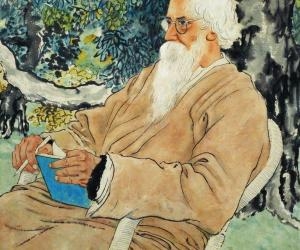(单词翻译:单击)
原文赏析
WHEN the gong sounds ten in the morning and I walk to school by our lane,
Every day I meet the hawker crying, "Bangles, crystal bangles!"
There is nothing to hurry him on, there is no road he must take, no place he must go to, no time when he must come home.
I wish I were a hawker, spending my day in the road, crying, "Bangles, crystal bangles!"
When at four in the afternoon I come back from the school,
I can see through the gate of that house the gardener digging the ground.
He does what he likes with his spade, he soils his clothes with dust, nobody takes him to task if he gets baked in the sun or gets wet.
I wish I were a gardener digging away at the garden with nobody to stop me from digging.
Just as it gets dark in the evening and my mother sends me to bed,
I can see through my open window the watchman walking up and down.
The lane is dark and lonely, and the street-lamp stands like a giant with one red eye in its head.
The watchman swings his lantern and walks with his shadow at his side, and never once goes to bed in his life.
I wish I were a watchman walking the streets all night, chasing the shadows with my lantern.
早晨,钟敲十下的时候,我沿着我们的小巷到学校去。
每天我都遇见那个小贩,他叫道:“镯子呀,亮晶晶的镯子!”
他没有什么事情急着要做,他没有哪条街一定要走,他没有什么地方一定要去,他没有什么时间一定要回家。
我愿意我是一个小贩,在街上过日子,叫着:“镯子呀,亮晶晶的镯子!”
下午四点,我从学校里回家。
从一家门口,我看得见一个园丁在那里掘地。
他用他的锄子,要怎么掘,便怎么掘,他被尘土污了衣裳,如果他被太阳晒黑了或是身上被打湿了,都没有人骂他。
我愿意我是一个园丁,在花园里掘地。谁也不来阻止我。
天色刚黑,妈妈就送我上床。
从开着的窗口,我看得见更夫走来走去。
小巷又黑又冷清,路灯立在那里,像一个头上生着一只红眼睛的巨人。
更夫摇着他的提灯,跟他身边的影子一起走着,他一生一次都没有上床去过。
我愿意我是一个更夫,整夜在街上走,提了灯去追逐影子。
背景阅读

内容简介
新月集(The Crescent Moon,1903)主要译自1903年出版的孟加拉文诗集《儿童集》,也有的是用英文直接创作的。诗集中,诗人生动描绘了儿童们的游戏,巧妙地表现了孩子们的心理,以及他们活泼的想象。它的特殊的隽永的艺术魅力,把我们带到了一个纯洁的儿童世界,勾起了我们对于童年生活的美好回忆。
作者简介
泰戈尔,印度著名诗人、作家、艺术家和社会活动家,生于加尔各答市的一个富有哲学和文学艺术修养家庭,13岁即能创作长诗和颂歌体诗集。曾赴英国学习文学和音乐,十余次周游列国,与罗曼·罗兰、爱因斯坦等大批世界名人多有交往,毕生致力于东西文明的交流和协调。泰戈尔以诗人著称,创作了《吉檀迦利》等50多部诗集,被称为“诗圣”。他又是著名的小说家、剧作家、作曲家和画家,先后完成12部中长篇小说,100多篇短篇小说,20多部剧本,1500多幅画和2000多首歌曲。天才的泰戈尔还是一位哲学家、教育家和社会活动家。1913年,泰戈尔以诗歌集《吉檀迦利》荣获诺贝尔文学奖。1915年,陈独秀在《青年杂志》(《新青年》)第2期上发表他译的《赞歌》4首。作品中“信爱、童心、母爱” 的思想,博大仁慈的胸怀,独具魅力的人格,赢得了无数中国读者的敬仰。
重要诗作
《故事诗集》(1900)、《吉檀迦利》(1910)、《新月集》 (1913)、《飞鸟集》(1916)、《边缘集》(1938)、《生辰集》(1941)。
重要小说
短篇:《还债》(1891)、 《弃绝》(1893)、《素芭》(1893)、《人是活着,还是死了?》(1892)、《摩诃摩耶》(1892)、《太阳与乌云》 (1894),中篇《四个人》(1916),
长篇:《沉船》(1906)、《戈拉》(1910)、《家庭与世界》(1916)、《两姐妹》(1932)。
重要剧作
《顽固堡垒》(1911)、《摩克多塔拉》(1925)、《人红夹竹桃》(1926)。
重要散文
《死亡的贸易》(1881)、《中国的谈话》(1924)、《俄罗斯书简》(1931)等。


